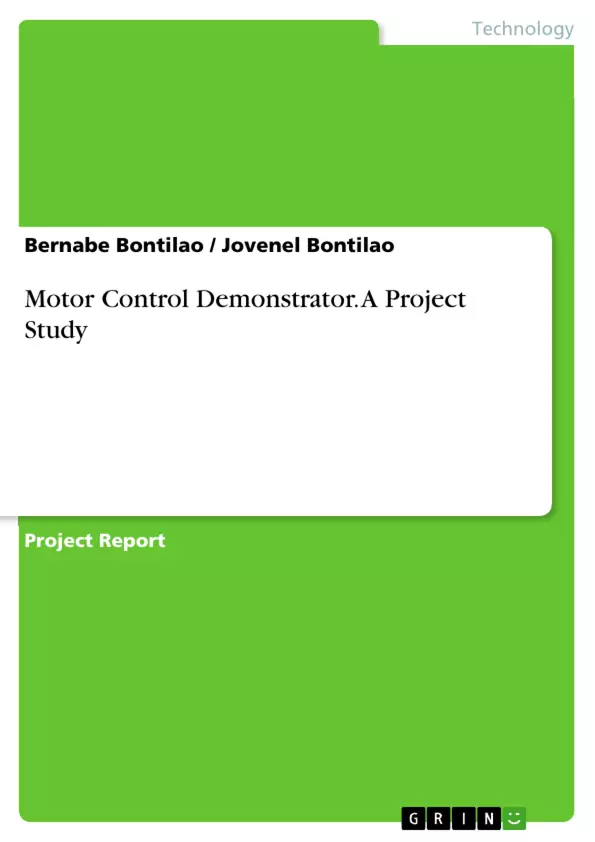The study was planned and developed to address the inadequacy of instructional materials in the performance of laboratory classes. The study aimed to test its functionality as well as evaluate its performance, as it would eventually be utilized as an educational demonstrator, specifically in the discipline of Electrical Technology. This motor control trainer allows students to conduct numerous motor controllers, and it includes an actual conveyor and incandescent lights as load demonstrators. This simulates the real motor controllers used in most industries. Industries would cease to exist if control systems were not adequately developed, coordinated, installed, and maintained.
The elements of the electrical system that starts, stops, and reverses motors that drive various mechanical equipment is known as motor controllers. This project may run a variety of motor controllers, including start-stop magnetic starters, multiple-push button magnetic starters, star-jog-stop magnetic starters, forward-reverse magnetic starters, manual sequential controller, automatic sequential controller, wye-delta magnetic starters, and the part-winding starting method.
As a result, the project benefits numerous stakeholders in academe and, indirectly, the labor market. The findings revealed a general weighted average of 4.83, a descriptive rating interpreted as highly functional, according to the evaluation results. Based on the findings, it is recommended that this be utilized as an instructional device and that creating a demonstrator is certainly doable; thus, comparable projects with greater capabilities should be produced. Basically, the Motor Control Demonstrator was developed and constructed in response to a perceived lack of training facilities/equipment.
Inhaltsverzeichnis (Table of Contents)
- INTRODUCTION
- Origin and Justification of the Study
- Objectives of the Study
- Significance of the Study
- Scope and Delimitation
- CONCEPTUAL FRAMEWORK
- Review of Related Literature and Studies
- Theoretical Framework
- Conceptual Model
- Operational Definitions of Variables
- DEVELOPMENT OF THE PROJECT
- Project Plan
- Supplies and Materials
- Tools and Equipment
- Construction Time Frame
- Construction Procedures
- Cost of Materials and Equipment
- Project Cost
- Pilot Testing and Revision of the Project
- Research Design
- Research Instrument
- Evaluators
- Data Gathering Procedure
- Evaluation of the Project
- Statistical Treatment
- Testing and Analysis of Data
- DESCRIPTION OF THE PROJECT
- Presentation, Analysis and Interpretation of Data
- Findings of the Study
- Structure of the Project
- Parts, Functions and Interrelationships
- Capabilities
- Limitations
- Process
- Operation Procedures
- Maintenance
- Safety and Control Measures
- SUMMARY, CONCLUSIONS AND RECOMMENDATIONS
- Summary of Findings
- Conclusions
- Recommendations
Zielsetzung und Themenschwerpunkte (Objectives and Key Themes)
The objective of this project study was to develop a motor control demonstrator that could be used as an instructional tool for electrical technology students. The study aimed to address the lack of adequate training facilities and equipment by providing a functional and effective tool for learning about motor control systems.
- The development of a functional and effective motor control demonstrator for educational purposes.
- The evaluation of the demonstrator's performance and functionality.
- The identification of the potential benefits of the demonstrator for students and educators.
- The analysis of the various motor control methods that the demonstrator can simulate.
- The investigation of the feasibility and cost-effectiveness of developing similar educational tools.
Zusammenfassung der Kapitel (Chapter Summaries)
The study begins by outlining the need for a functional motor control demonstrator for electrical technology students. This need is addressed by outlining the study's objectives, its significance, and the scope of the project. The development of the project is detailed in the subsequent chapter, providing a comprehensive overview of the planning, design, construction, and testing phases. The chapter also includes an analysis of the materials, tools, and equipment used in the construction process.
The project's capabilities and limitations are described in detail, outlining the various motor control methods that the demonstrator can simulate, as well as the limitations of the project's design. The study culminates with an evaluation of the project's effectiveness, highlighting the positive feedback received from evaluators. The study concludes with a summary of the findings, key conclusions drawn from the study, and recommendations for future development and applications of the project.
Schlüsselwörter (Keywords)
The primary focus of this project study is on the development and evaluation of a motor control demonstrator. This encompasses various aspects related to motor controllers, including the use of magnetic starters, sequential logic control, and different starting methods. The project aims to provide a practical learning tool for electrical technology students, emphasizing the importance of effective training resources in this field. The key terms and concepts include motor control, motor controllers, motor control demonstrator, magnetic starters, sequential logic control, and practical training resources.
Frequently Asked Questions
What is a Motor Control Demonstrator?
It is an educational tool designed for laboratory classes in Electrical Technology. It allows students to simulate and test various industrial motor control methods using actual loads like conveyors and lights.
Which motor control methods can be simulated with this trainer?
The demonstrator can run start-stop starters, forward-reverse starters, manual and automatic sequential controllers, wye-delta starters, and part-winding starting methods.
Why was this project developed?
It was constructed in response to a lack of adequate training facilities and instructional materials for students studying motor control systems in the academe.
How was the functionality of the demonstrator evaluated?
The project was evaluated by experts and received a weighted average of 4.83, which interpreted as "highly functional" according to the research findings.
What are the components of the electrical system in this trainer?
The system includes magnetic starters, push buttons, load demonstrators (conveyor/lights), and safety control measures to simulate industrial environments.
What are the recommendations of the study?
The study recommends using the demonstrator as a standard instructional device and encourages the development of similar projects with even greater capabilities for the labor market.
- Citar trabajo
- Bernabe Bontilao (Autor), Jovenel Bontilao (Autor), 2010, Motor Control Demonstrator. A Project Study, Múnich, GRIN Verlag, https://www.grin.com/document/1348009



